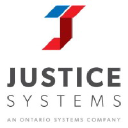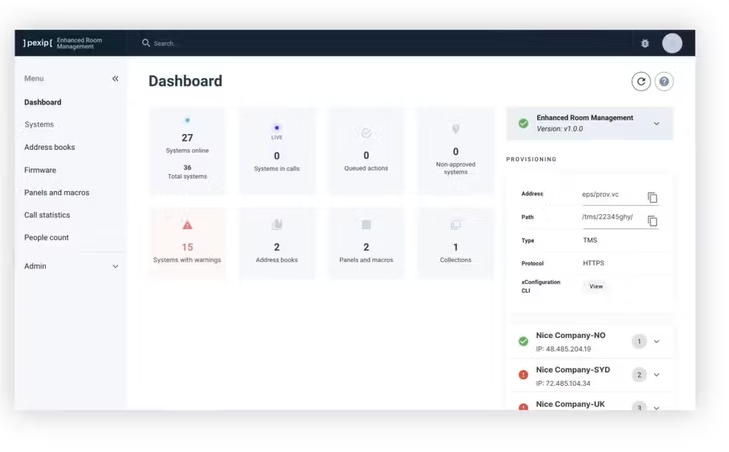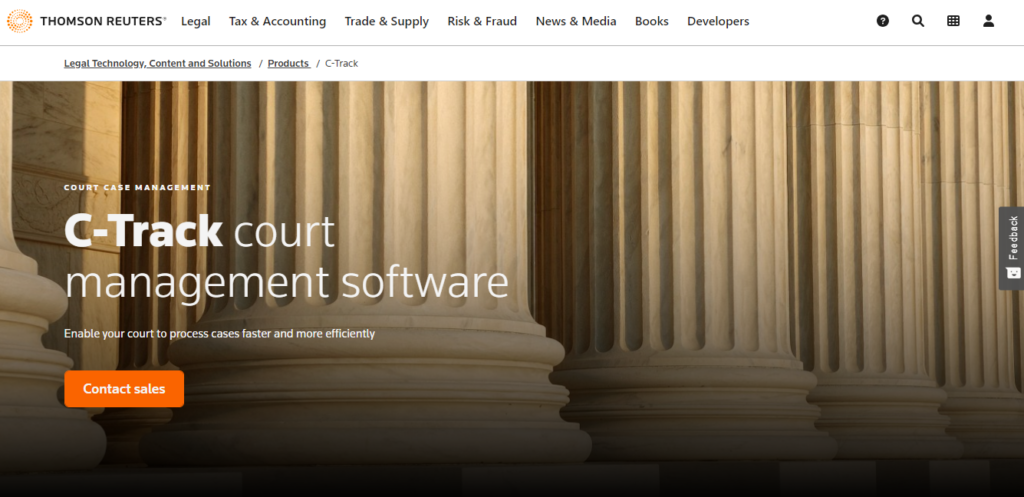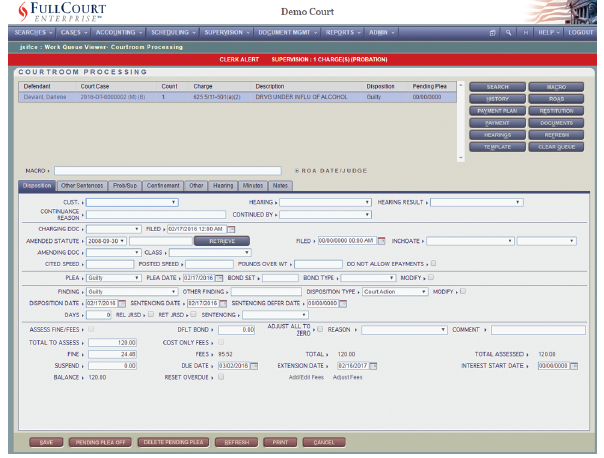10 Best Court Management Software Shortlist
Here's my pick of the 10 best software from the 21 tools reviewed.
Get free help from our project management software advisors to find your match.
As someone who's spent considerable time in the legal sector, I understand the critical role that effective case management software can play. It's more than just an organizational tool, it's a lifeline that ties all your case files, benchmarks, case data, and notifications together in one centralized, web-based hub.
This software is like an extended arm of your practice, configurable to your unique needs, whether you're dealing with caseloads ofmunicipal court or managing different jurisdictions. Imagine having an "Outlook" for all your legal activities, where you can monitor the life cycle of your cases, write and access case notes, and even use templates to standardize your case flow.
What Is A Court Management Software?
Court management software serves as a technological ally for those in the legal field, aiding in the efficient and effective handling of court cases and administrative tasks. This includes judges, court clerks, legal secretaries, paralegals, and even law enforcement agencies who use it to simplify and streamline operations.
From case scheduling and tracking, document management, and reporting, to enhancing interdepartmental coordination and improving record-keeping accuracy, court management software provides an integrated platform for managing a wide range of judicial activities. It's a powerful tool that brings organization and clarity to an often complex and demanding environment, optimizing legal processes and enabling the court system to function smoothly.
Best Court Management Software Summary
| Tool | Best For | Trial Info | Price | ||
|---|---|---|---|---|---|
| 1 | Best for virtual court hearings and remote collaboration | Not available | Website | ||
| 2 | Best for full court enterprise and appellate solutions | Not available | Pricing upon request | Website | |
| 3 | Best for litigation firms seeking efficient case management | Not available | Pricing upon request | Website | |
| 4 | Best for large-scale case management in high-volume courts | Not available | Pricing upon request | Website | |
| 5 | Best for streamlining operations across multiple agencies | Not available | Pricing upon request | Website | |
| 6 | Best for audio and visual recording to ensure accurate record-keeping | Not available | Pricing upon request | Website | |
| 7 | Best for automating court operations in local government | Not available | Pricing upon request | Website | |
| 8 | Best for digital court recording and content management | Not available | Pricing upon request | Website | |
| 9 | Best for integrating legal practice management with powerful analytics | Not available | From $150/user/month. | Website | |
| 10 | Best for managing juvenile justice case proceedings | Not available | Pricing upon request | Website |
Best Court Management Software Reviews
Pexip provides a platform for conducting virtual court proceedings, a tool that aims to revolutionize the traditional approach to justice administration. By enabling secure, high-quality video meetings and conferences, it's particularly fitting for judicial systems needing to adapt to modern circumstances.
Why I Picked Pexip: I chose Pexip due to its focus on facilitating virtual court proceedings. This specialization makes it stand out among other court management tools. With the shift towards virtual operations in many sectors, including the judiciary, I determined that Pexip is 'best for virtual court proceedings' due to its ability to provide a secure and reliable platform for conducting court sessions online.
Standout Features & Integrations:
Pexip offers secure, high-quality video conferencing that maintains the gravity and decorum of court proceedings. It also provides a virtual waiting room feature, ensuring order and control over the meeting participants. Pexip can integrate with various video conferencing platforms, including Microsoft Teams, Google Meet, and Zoom, providing flexibility and ease of use for different users.
Pros and cons
Pros:
- N/A
- Can integrate with various popular video conferencing platforms
- High-quality video conferencing maintains court decorum
- Specifically designed for virtual court proceedings
Cons:
- N/A
- Dependence on other video conferencing platforms for maximum utility
- Lack of other court management features, focuses primarily on virtual proceedings
- Pricing information is not readily available
C-Track is a comprehensive case management solution offered by Thomson Reuters, a renowned name in the world of legal technology. This tool is purpose-built to streamline the complexities associated with large-scale court systems, aligning with its best use for managing such extensive operations.
Why I Picked C-Track: In my judgment, C-Track stands out due to its ability to handle large-scale operations effectively. Its robust aspects are backed by the reputation of Thomson Reuters, makes it a trustworthy choice. I picked it as the best for large-scale court systems because it’s designed to deal with the intricacies of such environments, providing a depth of functionality that's well-suited for extensive court networks.
Standout Features & Integrations:
C-Track offers comprehensive case management, e-filing, public access, judicial tools, and appellate solutions. Its ability to effectively manage complex court workflows is commendable. As for integrations, C-Track also offers compatibility with other Thomson Reuters legal products, enhancing its utility in a comprehensive legal tech ecosystem.
Pros and cons
Pros:
- N/A
- Integrates well with other Thomson Reuters products
- Comprehensive features for extensive court systems
- Designed by Thomson Reuters, a reputable name in legal technology
Cons:
- N/A
- Dependence on other Thomson Reuters products for maximum utility
- Might be overly complex for smaller court systems
- Pricing information is not readily available
TrialWorks is a unique case management software made to provide users with robust features that streamline the handling of case details, documents, contacts, docket, and more. Given its focus on case management in legal contexts, I see it as a top choice for law firms.
Why I Picked TrialWorks: I picked TrialWorks because it's a well-rounded software that simplifies case management in law firms. What sets it apart is the attention it pays to the unique needs of legal professionals, its also providing a balance between ease of use and comprehensive functionality. This tailored approach makes it ideal for law firms seeking efficient case management solutions.
Standout Features & Integrations:
TrialWorks offers an array of useful characteristics, such as detailed case tracking, document management, and a robust docketing system. It also comes with a user-friendly dashboard that provides a comprehensive overview of all case activities. For integrations, TrialWorks interfaces effectively with popular programs like Microsoft Office, Adobe, QuickBooks, and various document imaging systems, enhancing its utility within an existing IT infrastructure.
Pros and cons
Pros:
- N/A
- Robust integrations with popular software
- Comprehensive document management system
- Detailed case tracking capabilities
Cons:
- N/A
- Less suitable for non-legal organizations
- May have a steep learning curve for some users
- Lack of transparent pricing information
FullCourt Enterprise is a comprehensive solution built for large-scale court operations. This all-in-one platform makes managing everything from case scheduling to reporting a more efficient task, ideal for larger courts in need of wide-ranging capabilities.
Why I Picked FullCourt Enterprise: FullCourt Enterprise caught my attention due to its all-encompassing approach to court management. This isn't a software that focuses on one or two areas; it covers the entire gamut, which sets it apart. When considering why it's best for large-scale court operations, I judged that the extensive characteristics it provides would be best leveraged by larger courts with diverse needs.
Standout Features & Integrations:
FullCourt Enterprise shines with its suite of case management characteristics, from scheduling to document management, all accessible in one platform. Its powerful reporting capabilities are another plus, that allows for in-depth analysis of court operations. As for integrations, FullCourt Enterprise offers seamless data exchange with other Justice Systems applications, enhancing its scope.
Pros and cons
Pros:
- N/A
- Seamless integration with other Justice Systems applications
- Features powerful reporting capabilities
- Offers an all-in-one platform
Cons:
- N/A
- Potentially steep learning curve due to its wide range of features
- May be overkill for smaller court operations
- Lack of transparent pricing
Best for streamlining operations across multiple agencies
Enterprise Case Manager Software is a comprehensive tool with its integrated system makes it an ideal choice for courts wanting to streamline operations within a unified system.
Why I Picked Enterprise Case Manager Software: I chose the Enterprise Case Manager Software for its capacity to manage all court processes in one place. Also, the integration of various tasks differentiates this tool, making it unique in the way it facilitates court operations. Given its capacity to provide an all-in-one solution, I firmly believe it's best for integrated management of all court processes.
Standout Features & Integrations:
The tool's most vital characteristic is its end-to-end case management that covers all stages from intake to disposition. Additionally, it includes characteristics like automated scheduling, workflow automation, and comprehensive reporting capabilities. In terms of integrations, the software can seamlessly interface with other solutions from Tyler Technologies, fostering a cohesive digital ecosystem.
Pros and cons
Pros:
- N/A
- Seamless integration with other Tyler Technologies solutions
- Automation capabilities for workflow and scheduling
- Comprehensive case management characteristics
Cons:
- N/A
- Limited third-party integrations
- May be more complex than needed for smaller courts
- Pricing is not transparent
CourtSmart offers a robust platform for digital audio and visual recording in court proceedings. The focus on recording differentiates it, making it ideal for courts that prioritize thorough and accurate documentation.
Why I Picked CourtSmart: I selected CourtSmart due to its unique focus on digital recording. Not all court management software includes this characteristics, and in my opinion, this gives CourtSmart a unique edge. As for why it's best for audio and visual recording, CourtSmart also allows courts to capture the details of proceedings accurately, which is invaluable in the legal context.
Standout Features & Integrations:
CourtSmart's recording technology is its shining star, capturing high-quality audio and video during court proceedings. It also provides transcription services, making easy conversion of recorded material into written format. CourtSmart also integrates with existing AV equipment and courtroom technology, making it an adaptable solution.
Pros and cons
Pros:
- N/A
- Integrates well with existing AV equipment
- Provides transcription services for easy document creation
- Excellent audio and visual recording capability
Cons:
- N/A
- Limited functionality beyond recording and transcribing compared to more comprehensive solutions
- May not be necessary for courts that do not require extensive recording
- Pricing information is not readily available
GovPilot provides a robust software solution designed to manage court cases within government systems. Also, its primary function is to streamline court operations, making it an excellent choice for government agencies aiming to modernize and increase the efficiency of their court case management.
Why I Picked GovPilot: GovPilot caught my eye because of its focus on improving government operations. Its comprehensive, government-oriented aspect and modern, user-friendly interface make it different from many other court case management solutions. As a result, I believe it's the best choice for government court case management because it provides features that fit the specific needs of government court systems.
Standout Features & Integrations:
GovPilot offers a suite of aspect including case tracking, scheduling, document management, and reporting. It also allows for the creation of custom digital forms and workflows. As for integrations, GovPilot can work with a variety of data management and government-specific software, though the specifics would need to be discussed with the vendor.
Pros and cons
Pros:
- N/A
- Comprehensive case tracking and reporting
- Custom digital forms and workflow capabilities
- Designed specifically for government court cases
Cons:
- N/A
- Specifics of integrations are not readily available
- Potential over-specialization for non-government court cases
- Lack of transparent pricing information
FTR Gold is a premium solution focused on delivering high-quality audio and video recordings for court proceedings. Its digital recording technology ensures accurate, reliable, and accessible records, which makes it a top choice for courts prioritizing exceptional recording capabilities.
Why I Picked FTR Gold: The reason I picked FTR Gold for this list is its excellent recording capabilities. Not every court management software emphasizes this aspect, but FTR Gold does, making it different and valuable for courts that demand high-quality audio and video recordings. It stands out as the 'best for impeccable audio and video court recordings' for its ability to deliver this so efficiently.
Standout Features & Integrations:
FTR Gold's digital recording technology ensures reliable, accessible, and high-quality audio and video records of court proceedings. It even has characteristics for note-taking and annotations to help enhance the usability of these recordings. When it comes to integrations, it supports connectivity with case management systems and offers cloud-based storage options for easy accessibility.
Pros and cons
Pros:
- N/A
- Integrations with case management systems
- Features for note-taking and annotations
- Superior audio and video recording capabilities
Cons:
- N/A
- May not be necessary for courts with simpler recording needs
- May not cater to all court management needs
- Pricing information not readily available
Litify is a comprehensive management platform designed for legal teams and law firms. It streamlines a variety of court-related operations, such as case management, client relationships, and document handling, making it an ideal choice for the management needs of law firms and legal departments.
Why I Picked Litify: I picked Litify for this list due to its comprehensive suite of features designed specifically for the legal industry. Its focus on meeting the unique needs of legal teams and law firms, as well as its extensive customization options, distinguish it from other software. I judged it as 'best for legal teams and law firms' because it addresses a wide array of their daily operational needs, from client relationship management to case tracking and reporting.
Standout Features & Integrations:
Litify's features also include detailed case management, automated document generation, and client relationship management, among others. These enable legal professionals to manage their workflows effectively. It also integrates with Salesforce, providing users with the benefits of Salesforce's CRM capabilities tailored to the needs of the legal industry.
Pros and cons
Pros:
- N/A
- Integration with Salesforce extends its functionality and capabilities
- Provides extensive customization options to meet specific needs
- Offers a comprehensive suite of features tailored for the legal industry
Cons:
- N/A
- Dependence on Salesforce for CRM capabilities may not appeal to all users
- The interface might require a learning curve due to the breadth of its features
- Pricing information is not readily available
YouthCenter is a specialized software platform built to handle juvenile court case management. Also, its aim is to provide efficient, effective tools for tracking and managing cases in the juvenile justice system. Given its unique focus on juvenile court cases, it emerges as the best choice for such scenarios.
Why I Picked YouthCenter: In selecting YouthCenter, I considered its specialized attention to juvenile justice, which sets it apart from more general court case management systems. Its comprehensive set of tools designed specifically for handling juvenile court cases makes it a standout choice. This specificity makes it particularly effective in juvenile court environments.
Standout Features & Integrations:
YouthCenter offers characteristics like detailed case tracking, data management, and reporting tools tailored for juvenile court needs. It also includes a secure portal for the sharing of sensitive information. Integration-wise, it works seamlessly with various data management and reporting tools, although exact details would need to be verified with the vendor.
Pros and cons
Pros:
- N/A
- Customizable reporting tools
- Secure data sharing portal
- Detailed case tracking features designed specifically for juvenile courts
Cons:
- N/A
- Exact details on integrations are not readily available
- Might be over-specialized for non-juvenile court cases
- Lack of transparent pricing information
Other Court Management Software
Below is a list of additional court management software that I shortlisted, but did not make it to the top 10. Definitely worth checking them out.
- Equivant
For case management flexibility in changing legal environments
- Odyssey Case Manager
For comprehensive case management with robust features
- VobeSoft
Good for collaborative legal case management
- CaseWorthy
Good for social services case management in legal scenarios
- eCourt
Good for digitizing court records and documents
- LawToolBox
Good for legal deadline management
- EXHIBITVIEW
Good for courtroom presentations and evidence management
- Jayhawk
Good for court case tracking and management
- VinterCOMM
Good for secure court hearing communications
- OnBase
Good for integrating legal documents with enterprise content management
- ProLaw
Good for comprehensive legal practice management
Other Legal Software Reviews
Here are some other popular types of legal software you might be interested in.
Selection Criteria For Court Management Software
As a legal professional who has tested and researched numerous legal tech tools, I can attest to the importance of several key factors when selecting the right software. I've evaluated dozens of legal tech tools and was specifically on the lookout for features that streamline court processes, improve case management and enhance client communication.
Core Functionality
The software should enable users to:
- Manage and track cases efficiently
- Handle document storage and retrieval
- Automate legal workflows
- Enable secure communication and collaboration
- Integrate with other legal tech tools or software
Key Features
There are several features that are particularly useful in legal tech software:
- Document Management: This includes features that allow for the secure storage, retrieval, and sharing of legal documents.
- Case Management: Tools that help manage, track, and update case progress are invaluable for staying organized.
- Workflow Automation: This helps automate repetitive tasks, streamlining processes and saving time.
- Secure Communication: Given the sensitive nature of legal work, secure channels for communication and collaboration are essential.
- Integration Capabilities: The ability to integrate with other legal tech tools or software used within the firm can greatly enhance functionality and efficiency.
Usability
When considering usability, I focused on the following elements:
- Intuitive Interface: Legal tech software should have a logical, easy-to-navigate interface that allows users to easily find and utilize its features.
- Easy Onboarding: The software should provide clear instructions and resources to help new users understand and utilize its functionality quickly.
- Customer Support: Robust customer support is crucial, ideally offering both quick response times and a comprehensive knowledge base.
- Role-based Access: This is important in a legal setting where different team members may require different access levels to case information.
- Training Program: Given the often complex nature of legal tech tools, a training program or learning library for onboarding users is highly beneficial.
People Also Ask (FAQs)
What are the benefits of using court management software?
Court management software offers several benefits, including:
- Improved Efficiency: The software helps automate many of the mundane tasks, saving valuable time and allowing court staff to focus on more crucial aspects of their work.
- Better Organization: With features such as case management and document management, these tools help keep everything in one place, increasing organization and reducing the chance of misplacing important information.
- Enhanced Communication: These tools provide secure channels for communication and collaboration, making it easier to coordinate with team members and share information.
- Decreased Errors: By automating processes, there’s a lower chance of human error, leading to more accurate work.
- Increased Security: The software offers secure storage for sensitive legal information, ensuring it’s protected from unauthorized access.
How much does court management software typically cost?
The pricing for court management software varies widely depending on the specific features, the size of the court system, and the vendor. Some vendors also offer a subscription model, charging a monthly or annual fee per user. Others may charge a one-time licensing fee.
What are the pricing models for court management software?
Most court management software vendors use either a subscription-based pricing model or a license-based model. Subscription-based models usually involve a monthly or yearly fee, while license-based models typically require a one-time payment for perpetual use of the software.
What is the typical range of pricing for court management software?
The price range can be quite broad, from as low as $20 per user per month to as high as several thousand dollars for large-scale, enterprise-level solutions. It’s best to contact vendors directly for accurate pricing based on your specific needs.
What is the cheapest and the most expensive court management software?
The cheapest software usually starts from around $20 per user per month, like LawToolBox. More advanced and comprehensive solutions like ProLaw can cost several thousand dollars, especially for larger organizations.
Are there any free court management software options?
Yes, there are some free options available, although they tend to offer limited features and are often best suited for small-scale or non-profit court systems. It’s important to thoroughly review the features and limitations of free software before making a decision.
Other Case Management Software Reviewed
Here are some other tools you may need if you are looking for matter and case management software solutions.
Summary
In conclusion, selecting the best court management software requires a keen understanding of your specific needs and a detailed evaluation of the available options. These software solutions offer a variety of features that can significantly improve court operations, making tasks more efficient, enhancing organization, and ensuring better communication.
Key Takeaways:
- Understand Your Needs: Knowing your specific requirements is critical. Do you need a solution that excels at document management, case management, or video conferencing? Identifying your key needs will guide your selection process.
- Evaluate Key Features and Usability: Not all court management software is created equal. Some might have an impressive array of features but fall short in terms of usability. Others might offer exceptional ease of use but lack advanced capabilities. Balancing features and usability based on your specific needs is crucial.
- Consider Pricing and Value: While pricing is an important consideration, the cheapest solution isn't necessarily the best. Conversely, the most expensive software might offer features you don't really need. Consider the value a solution provides in relation to its cost. And remember, some vendors offer pricing upon request, so don't hesitate to reach out to get a more accurate picture.





















